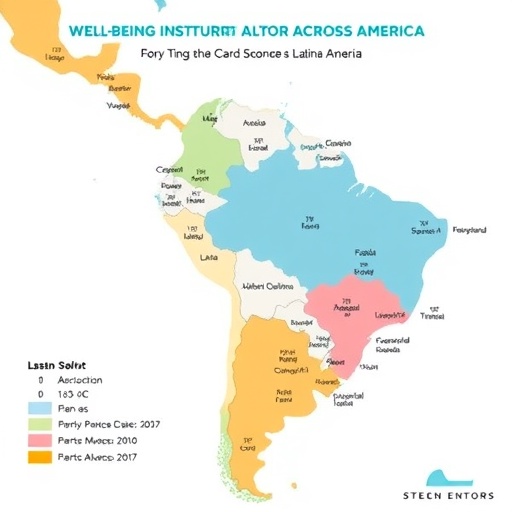In a significant advancement in psychological assessment tools, researchers led by Mendoza-Jiménez and colleagues have validated the 10-Item Well-being Instrument (WiX) across four South American countries: Argentina, Chile, Ecuador, and Peru. This robust validation study assesses the reliability and applicability of the WiX in diverse cultural contexts, aiming to provide mental health professionals with an effective tool to gauge well-being. The WiX, with its concise format, aims to enable quicker assessments while maintaining the integrity of mental health evaluations.
The research began with a comprehensive review of existing well-being instruments, recognizing the need for a culturally adaptable tool. The WiX allows mental health practitioners to evaluate subjective well-being and psychological resilience efficiently. As mental health awareness grows in Latin America, the urgency for standardized instruments becomes evident. The validation process involved extensive pilot testing, ensuring that the WiX could resonate with different cultural values and social contexts in these countries.
One of the striking outcomes highlighted in the study is the high reliability coefficients obtained from the statistical analyses, including Cronbach’s alpha and composite reliability measures. These results reinforce the WiX’s ability to produce consistent results, making it a trusted instrument for practitioners. By focusing on subjective well-being, researchers demonstrated that the WiX caters to specific cultural nuances, thereby promoting better understanding and assessment of mental health in diverse populations.
Moreover, the study incorporated feedback from local experts and community leaders, underscoring a participatory process that was crucial in refining the instrument. By including these stakeholders, the researchers tapped into invaluable insights that enhanced the cultural relevance of the WiX. This collaborative approach not only bolstered the study’s findings but also fostered community engagement, which is vital for effective mental health interventions.
Throughout the validation phase, data were collected from a diverse participant pool in each country, variably encompassing different socioeconomic backgrounds. This diversity enriches the research findings, ensuring that the tool is adequately tested across various demographics. The statistical analyses performed demonstrated strong construct validity, confirming that the WiX measures the intended psychological constructs effectively.
In addition to the reliability and validity metrics, the researchers thoroughly examined the usability of the WiX in real-world settings. The simplicity and brevity of the instrument make it well-suited for busy mental health professionals who require efficient assessment tools. This practicality is particularly important in regions where mental health resources are limited, making quick yet reliable assessments essential.
Another dimension explored in the research was the potential impact of the WiX on public health initiatives addressing mental well-being. With the increasing recognition of mental health’s role in overall health, policymakers can benefit from using reliable instruments like the WiX to gauge community well-being. This insight paves the way for targeted mental health programs that address local needs and cultural specificities, ultimately leading to improved mental health outcomes.
The researchers further emphasize that longitudinal studies should follow this validation to track the instrument’s effectiveness over time. Monitoring changes in well-being across populations using the WiX can provide critical insights into mental health trends, guiding future interventions. Such studies will be especially important in understanding the long-term impact of socioeconomic factors on mental health in the region.
With the WiX now validated, the next steps for the research team include disseminating their findings to mental health practitioners and stakeholders throughout Latin America. Educating practitioners on the tool will empower them to use the WiX effectively, thereby enhancing the quality of mental health assessments. Workshops and training sessions can facilitate this process, bridging the gap between research and practice.
This research also underscores the importance of adapting psychological instruments to meet local needs. The validation of the WiX serves as a model for future studies aiming to create localized mental health assessment tools. By understanding that well-being is influenced by cultural factors, other researchers can develop instruments that resonate more with specific populations, ultimately advancing mental health science.
As the field of psychological assessment continues to evolve, the successful validation of the WiX across Argentina, Chile, Ecuador, and Peru serves as a remarkable achievement. It not only addresses the immediate need for reliable mental health assessment tools but also fosters the ongoing dialogue about mental well-being in Latin America. This dialogue is crucial in shaping policies and interventions that will cater to the unique psychological landscape of these countries.
In conclusion, the successful validation of the 10-Item Well-being Instrument signifies a vital step forward in the realm of mental health assessment. The rigorous approach taken by Mendoza-Jiménez and their team offers an exemplary framework for developing culturally competent tools that can be implemented globally. As mental health continues to garner attention worldwide, instruments like the WiX will play an essential role in enhancing our understanding and promotion of well-being across diverse populations.
Subject of Research: Validation of the 10-Item Well-being Instrument (WiX)
Article Title: Validation of the 10-Item Well-being Instrument (WiX) in Argentina, Chile, Ecuador, and Peru
Article References:
Mendoza-Jiménez, M.J., Jara, K.T., van Exel, J. et al. Validation of the 10-Item Well-being Instrument (WiX) in Argentina, Chile, Ecuador, and Peru.
Applied Research Quality Life (2025). https://doi.org/10.1007/s11482-025-10519-w
Image Credits: AI Generated
DOI: https://doi.org/10.1007/s11482-025-10519-w
Keywords: well-being, mental health, psychological assessment, Latin America, cultural adaptation, reliability, validation.




